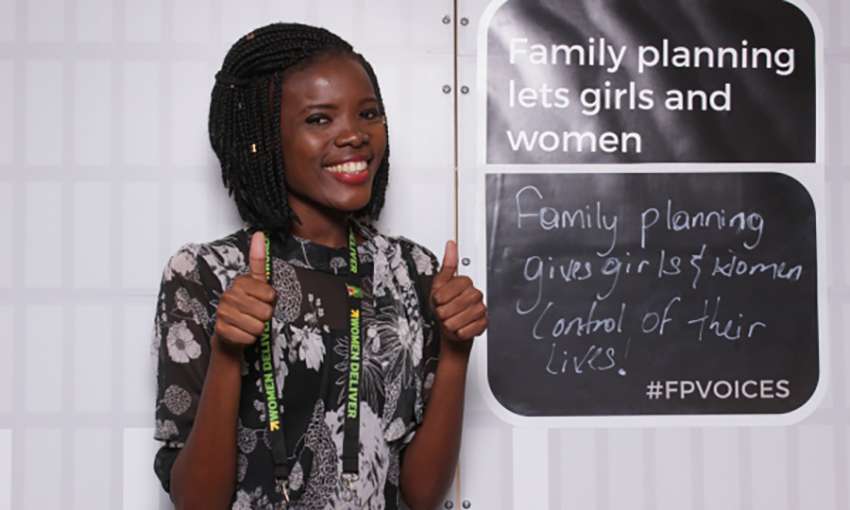
Patricee Douglas, MBBS, a 120 Under 40: The New Generation of Family Planning Leaders winner of 2016, stands out as the only winner from the Caribbean region. The program, organized by the Bill & Melinda Gates Institute for Population and Reproductive Health at the Johns Hopkins Bloomberg School of Public Health, shines a light on the “positive disruptions” made by young leaders in family planning.
Douglas, from Guyana, is a passionate advocate for empowering teenage mothers. For Women Across Differences, an NGO that seeks to reintegrate teenage mothers into the school system, she serves as the sexual and reproductive health and rights (SRHR) counselor. She is also the medical director of Days for Girls Guyana, and supports the Ministry of Public Health as a peer educator. She used her $1,000 120 Under 40 grant award to launch SRHR Adventures, an organization that expands her advocacy and educational work in SRHR in Guyana—with an emphasis on fun, creative, and taboo-shattering approaches.
What are the most underreported reproductive health stories involving young women in Guyana?
From what I’ve seen, the most underreported stories about reproductive health—and even the sexual abuse—of young women in Guyana include rape and sexual molestation, especially in cases perpetrated by a family member—and the related issue of adolescent pregnancy stemming from sexual abuse.
Coercion by partners into unprotected sex, because of a lack of negotiating skills or because young women are afraid their partners will leave them if they refuse to have sex without condoms, is another issue. In addition, many women refuse birth control because their partners “instructed” them against use, citing myths—such as, it will lead to infertility or cancer; they will feel the IUD string while having sex, or the pills will cause their partner to gain weight.
DIY abortions, due to the stigma attached to accessing abortion services and the high rates of unwanted/unplanned pregnancies, are also underreported. Still, women and girls find ways to get rid of unwanted pregnancies, such as using Cytotec (Misoprostol) unsupervised.
Has your “SRHR Adventures with Dr. Pat” program, launched with your 120 Under 40 grant, helped you break new ground reaching young women on social media, in terms of encouraging questions and conversations about sensitive topics?
Oh, yes, it certainly has—even young men have reached out to me! Before the advent of the Facebook page “SRHR Adventures with Dr. Pat,” I conducted group sessions, and people would approach me after with personal questions that they didn’t feel safe asking in a group setting. However, I have noticed that people feel safe sending extremely personal questions concerning their sexual lives, fear of STIs, infertility issues, etc. through Facebook. I provide a non-judgmental and confidential zone to those who reach out to me. Whatever is said remains confidential, unless I’m given permission to share their question with others who may be better positioned to help them.
Along with your family planning educational efforts with teen mothers, do you also try to reach out to and educate young men—or is that a possibility for the future?
Even though my family planning promotion works is focused on women and girls, I encourage men and boys to participate in the sessions. I have realized that—out of a desire to empower women and girls to take control of their sexual and reproductive health—other programs have failed by leaving the male counterparts out of the conversations. That practice has proven counterproductive. For example, you might empower a woman to use contraception, but when she arrives at home if her spouse tells her not to use it, she most likely won’t. But when spouses are also educated on the importance and the myths are dismantled, the likelihood of the couple using birth control increases significantly.
In your work raising awareness about preventing HPV in Guyana, have you encountered parents reluctant to let their daughters be vaccinated, and if so how have you countered that?
Opposition to the vaccine by parents and the general public has been the biggest challenge thus far, due to the myths people have been fed about the vaccine. Many parents are concerned that the vaccine will lead to infertility in their daughters, and that it is “a sex vaccine”—meaning that if given, it will encourage their children to have sex at an early age.
SRHR Adventures has been countering that through the “HPV Vaccine Awareness Campaign” that seeks to educate the public on the importance of the vaccine and to dismantle the myths surrounding it. Since launching the campaign last April, I’ve heard from a lot of people that they have gotten their daughters vaccinated after hearing our program on the radio or TV, or through one of our local sessions.
Through the campaign, we’ve learned that a lot of Guyanese aren’t aware of what human papilloma virus (HPV) is, and how serious it is—or that there is a vaccine, free of charge, that prevents HPV-related cancers such as cervical cancer. Following our sessions people—even those who had previously voiced reservations about the vaccine—approach us to find out where they can get their kids vaccinated and express disbelief that no one had told them about the vaccine.
As a mentee in the Commonwealth Women’s Mentorship Scheme, how do you think young women can best support each other in this field?
When women support each other, the possibilities are endless! In this field, it is particularly helpful for us to support each other by sharing relevant information with each other, celebrating each other’s accomplishments, and seeking out opportunities to promote each other’s successes.
My mentor, who has a wealth of experience in SRHR promotion, helped me develop a way to engage key groups such as adolescent mothers and the LGBTQ society in SRHR Adventures activities.
Source: https://www.globalhealthnow.org/2017-08/shattering-taboos-guyana-qa-patricee-douglas
